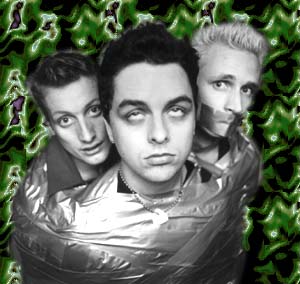Bright New Green Day
On 'Nimrod,' Green Day
By Gina Arnold
SOMETIMES I wonder what Nirvana would sound like now, if it hadn't been forced to disband in 1994 by the death of Kurt Cobain. Doubtless, the band would have faced the same problem that Green Day has faced since the release of its phenomenally successful 1994 LP, Dookie.
Just as Nirvana created a backlog of bands who played grunge by numbers, so too did Green Day usher in a host of sound-alike punk-pop bands. And although imitation may be the sincerest form of flattery, it also eventually creates a backlash as the airwaves fill up with boring and derivative acts.
It was ever thus, of course: the '60s generated a lot of bad psychedelic rock, while Led Zeppelin spawned a surfeit of awful hard-rock bands in the '70s. Skip ahead a few years, and you have Blink 182, Nerfherder, Offspring and Millencolin--just a few of the bands created in the precise image of Green Day. Their collective arrival on the scene has made it Green Day's subsequent sad task to prove itself the best of the bunch--and to do so, moreover, with the fairly limited palette of chords and instruments that its chosen genre provides.
That's a hard thing to ask of a bunch of 22-years-olds, particularly since Green Day is none too original a band, having taken its cue from a bunch of underappreciated punk-rock sources in the first place. Insomniac, the band's last album, came hard on the heels of Dookie and was more of the same, only less effectively rendered.
But Nimrod (Warner Bros.), the band's third major-label album (and fifth overall), is another story entirely. It's a great album that shows a surprising amount of growth while still staying well within the parameters of punk. Nimrod is head and shoulders above Green Day's competitors and Green Day's own previous work.
Nimrod starts slowly, however: the first three songs are all adequate but somewhat rote. Only on the fourth song, "Redundant," does the band finally flower, bursting into a richer and more harmony-laden mix that is well beyond the reach of most guitar-bass-drums trios. If you think of Green Day as a band that used the musical equivalent of bright primary colors for its strokes, this is the album on which they figure out how to make green, orange and purple.
Green Day has always attempted to blend the Beatles with the Buzzcocks; on Nimrod both influences are in evidence (indeed "Worry Rock" cops a line from "Nowhere Man," an underrated Beatles song from Yellow Submarine). Many other influences can be heard as well. "Uptight" sounds a bit like Blondie's "Sunday Girl," only with a swifter tempo and snappier chorus. "Last Ride In" is a surf-inspired instrumental complete with farfisa organ (and, at 3-3/4 minutes, the longest track on the album, which squeezes 18 songs into only 49 minutes). "Walking Alone" comes across as a Muffs-like '50s doo-wop number. "King for a Day" is a goofy track with a circus-music fill that recaptures the irresistible verve of the band's pre-Dookie LP Kerplunk.
Strangely, the first single from the album, "Hitchin' a Ride," is not one of the better songs, belonging as it does to a group of emotionally retarded numbers about being a negative loser who's bound to fail. On "The Grouch," singer Billie Joe Armstrong (who's pushing 25) states his current world view: "I was a young boy that had big plans / Now I'm just another shitty old man / The world's a weasel / Fuck you." "Jinx" begins "I fucked up again, it's all my fault," and the title of "Reject" speaks for itself.
This is all previously covered Green Day territory, but thankfully, elsewhere the album does branch out lyrically. The wonderfully buoyant "Haushinka" far exceeds anything Green Day's written before, and it's not the only song that has somehow kicked the stakes up a notch, combining a punk-based tempo with the sort of pop tunes one associates with crunchy mid-'70s K-TEL hits such as Looking Glass' "Brandy" or the Raspberries' "Go All the Way." "Prosthetic Head" is a midtempo number with a compelling melodic bounce; so too are "Scattered" and "All the Time," both of which are reminiscent of Green Day's swift and effective live take on that stupid Frank Stallone tune "Eye of the Tiger."
The aforementioned songs alone would be an embarrassment of riches, but the standout track is definitely "Good Riddance." This touching acoustic ballad about looking back fondly at your youth and contemplating the passage of time even includes a mournful cello fill. (Hell, if Nirvana could tour with a cello, why not Green Day?)
"Good Riddance" is the final proof that Armstrong is not merely the charismatic frontman of a goofy punk-rock band but a genuinely talented songwriter. He clearly has the chops to grow beyond the genre he started in, and he's beginning to use them. It'd be nice to see him write slightly less self-reflexive lyrics, but his musical savvy easily overcomes his self-absorption. Nimrod is not only a cut above mere punk-pop, but a cut above, period.
[ Metro | Metroactive Central | Archives ]

It's a Wrap: Green Day's latest album, 'Nimrod,'
carries the band to new heights.
takes a big step forward
From the Oct. 16-22, 1997 issue of Metro.
![[Metroactive Music]](/music/gifs/music468.gif)